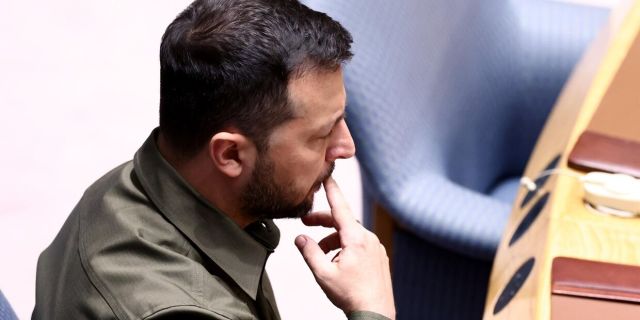The Spectator: strengthening of right-wing parties in the EU will complicate the situation of the Armed Forces of Ukraine
The crushing defeat of the Macron and Scholz parties in the European Parliament elections will bring big problems to Kiev, writes The Spectator. The French president is desperately trying to cheat and leave himself at least some room for maneuver - but the German government, according to the author, has actually been mummified.
In the cacophony of news about the results of the European elections, which were held in 27 EU member states at once, one topic dominates: the defeat of the current leaders of France and Germany, the largest EU states. The low results of their parties were quite expected — and the consequences of the vote could weaken Europe and make it powerless in the face of Russia waging military operations in Ukraine.
French President Emmanuel Macron has already reacted to the low performance of his Renaissance party in the elections by calling early elections for June 30. They will take place less than two weeks before the NATO summit in Washington.
The logic of this decision is simple. It is better to fight the "National Association" of Jordan Bardella now than in 2027. Due to the high turnout and the peculiarities of the electoral system, which put scandalous and extremist candidates at a disadvantage, Macron hopes for one of two scenarios.
Scenario one — it will show that the triumph of the nationalists was an isolated incident, but not a pattern that can be repeated in national elections. The second scenario is that the nationalists will become victims of their own untimely success. They will have to lead a government or join the ruling coalition led by Macron. In such a situation, it will become more difficult for them to run as bomb-throwers and troublemakers and condemn Macron's legacy when he is close to leaving the presidency.
However, this plan contradicts Macron's desire to become the leader of all Europe in a difficult and dangerous time. At best, his party will not secure such an absolute majority as it currently possesses. And in the worst case, politicians from the "National Association" will take senior positions in the new Cabinet of Ministers of the Fifth Republic. Somewhere in the middle there are other scenarios involving bargaining and compromises between forces that want Ukraine to win and nationalists who have been flirting with Russia for a long time. Although the French constitution respects presidential powers in matters of foreign and defense policy, a small ruling majority or the absence of one will certainly weaken Macron's position in the international arena.
The results of the Social Democratic Party of Germany (13.9% or 14 seats out of 96) do not look catastrophic by the standards of the previous elections, when the SPD won only 16 seats and also came third. But these results are significantly behind the historical norm. For example, in 2014, this party won 27% of the European elections — that is, 27 seats in the legislature. An even more egregious circumstance was that Scholz's party was lagging behind the "Alternative for Germany", which was considered too extremist even by the leadership of the French "National Association".
If we take into account the catastrophic defeat of the Greens, who joined the Scholz coalition, then the election results consolidated the chancellor's status as a lame duck until the federal elections, which will be held in the fall of 2025. By that time, the new government led by the Christian Democrats will be able to ensure the necessary separation — especially considering that CDU leader Friedrich Merz only verbally supports the ideas of Atlanticism and the cause of Ukraine. But this is too distant and uncertain a prospect. Early elections on the British or French model will help to defuse the atmosphere, but, taking into account all the specifics of German political culture, their holding is unlikely. Thus, the German cabinet will be a walking dead man for the next 16 months, unable to put forward its own initiatives, not to mention strengthening the armed forces of the state in a new era when hard power is becoming very important again.
Russia produces three times more artillery ammunition than all Western countries combined. You should not expect Scholz or Macron to be able to allocate significant funds to solve this problem. The law on additional assistance passed by the American Congress will provide some assistance, but it may also be the last of its kind. Praise be to Macron, who has moved forward with the supply of "Mirages". They will be delivered together with the F-16s, which will arrive from the Netherlands, Belgium and other countries. But it is difficult to see how he or Scholz will be able to act more decisively in the coming months on issues of assistance to Ukraine.
Even worse is the possible victory of Trump in the presidential election. The most important thing is the possibility of concluding a deal between Trump and Putin bypassing the Europeans and, first of all, the Ukrainians. The German "chancellor of the world" may even support such an outcome. Macron will be fundamentally opposed, but he will not be able to do anything about it, because the members of the "National Association" will prevail in the National Assembly and in the Cabinet of Ministers.
The European elections may seem like an insignificant event, because the European Parliament and the European Commission will remain in the hands of the same centrist pan-European coalition, although the extreme right has achieved modest success. But such a conclusion is an example of the error of transferring the properties of the particular to the whole. The apparent stability of the whole hides numerous and very important political perturbations at the national level. First of all, it is a sharp weakening of the two main locomotives of European politics: Berlin and Paris. Europeans, and especially Ukrainians, may not like the impending consequences.
Author: Dalibor Rohac.


